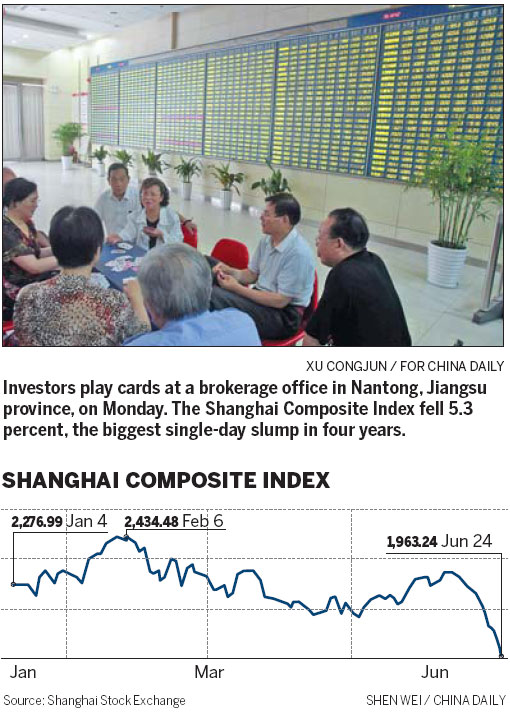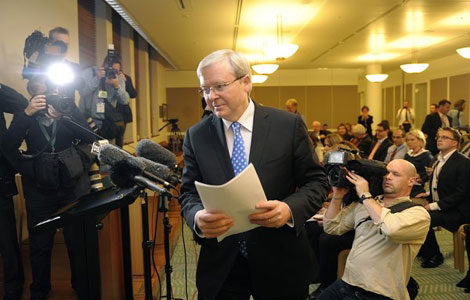Equities sink 5.3% to fresh 2013 low
Updated: 2013-06-25 07:41
By Xie Yu in Shanghai (China Daily)
|
||||||||

Chinese stocks sank more than 5 percent on Monday to a fresh 2013 low as investors concluded the government would not take any steps to boost the market.
The central bank issued a statement in the day, saying that the credit market is not facing an imminent crisis and banks should improve their liquidity management.
The statement from the People's Bank of China was taken by many analysts as a clear signal that the government had no plans to intervene in the market. Analysts said some investors took the statement as a sign to cut their losses, while others simply stayed on the sidelines.
The benchmark Shanghai Composite Index fell 5.3 percent, the biggest single-day slump in four years, to 1,963.24 points. Turnover contracted sharply to 88 billion yuan ($14.36 billion) from 334.7 billion yuan on the previous trading day.
Bank shares led the slump, with major losses among property, brokerage, nonferrous metal and aviation stocks as well.
Hong Kong's benchmark Hang Seng Index declined 2.22 percent to 19,813.98.
The Hang Seng Finance Index, a gauge of mainland banks listed in Hong Kong, turned in a fifth day of losses, retreating 2.3 percent. Industrial and Commercial Bank of China Ltd sank 3.03 percent to HK$4.48 (58 US cents). Bank of China Ltd fell 2.6 percent to HK$2.99.
"That is a collapse. The market was expecting the central bank to inject liquidity, but the hopes were chilled. It seems the authorities are determined to maintain a prudent stance to reduce leveraged operations in the financial market," said Jason Yue, senior analyst with an investment company in Shanghai.
Interbank interest rates have been setting record highs since mid-June. Rumors were spreading about major banks defaulting amid funds shortages and urging the central bank to cut the reserve requirement ratios.
Money market jitters soon spread to the stock market, where panicked investors began to cash out.
The central bank issued a statement on its second-quarter monetary policy committee meeting on Sunday evening, saying that the committee had agreed to "fine-tune policy when necessary".
"While we acknowledge this 'fine-tuning' statement is less hawkish than the overall message from the (first-quarter monetary policy committee) meeting, we are not convinced that the policy stance has shifted from tightening to loosening," Zhang Zhiwei, an economist with Nomura Securities Co Ltd, wrote in a note on Monday.
Further, added Zhang, the central bank's statement also said the monetary policy committee had agreed to "contain financial risks with more solid actions", which "suggests to us that the policy objectives have not changed. The financial risks in the economy are not yet fully under control. Policy tightening only started in mid-March, and a shift of policy to an easing bias would exacerbate these financial risks".
Gao Shanwen, chief economist at Essence Securities Co Ltd, warned of further serious problems amid the tightening in the interbank market.
"The bill market and wealth management market, which are highly dependent on the interbank market, will be crushed, as commercial banks are struggling with liquidity," he said.
"Some local government financing vehicles are using very high-leverage, short-term financing to support long-term assets with no cash flows. They cannot cope with sharp volatility in their short-term financing costs," he added.
There are almost universal expectations of a prolonged crunch in the Chinese financial markets, a situation that is largely interpreted as the new leadership's determination to kill arbitrage, speculation and underground lending. These activities are based on loose liquidity, but they increase leverage and financial risk without supporting the real economy.
In the near term, however, the expiration of 400 billion yuan in central bank notes, as well as small growth in foreign-exchange funding positions, will provide liquidity relief in the system. That said, banks will be more scrupulous in managing their liquidity, and as such, cash shortages will likely ease but not vanish, according to Hong Hao, managing director and chief strategist at BOCOM International Holdings Co Ltd.
Cai Xiao in Beijing contributed to this story.
xieyu@chinadaily.com.cn
(China Daily USA 06/25/2013 page13)

 Philippine, US start Naval exercise in S China Sea
Philippine, US start Naval exercise in S China Sea
 Supreme Court gay rights ruling celebrated across US
Supreme Court gay rights ruling celebrated across US
 Rudd returns as Australian PM after Gillard
Rudd returns as Australian PM after Gillard
 Brazil protests intensify before Confed Cup semifinal
Brazil protests intensify before Confed Cup semifinal
 Long lost weekend
Long lost weekend
 Park ready to charm China
Park ready to charm China
 Prices climb as police crack down
Prices climb as police crack down
 China 'most promising' in FDI
China 'most promising' in FDI
Most Viewed
Editor's Picks

|

|

|

|

|

|
Today's Top News
Proposed law puts curbs on family visas
Markets will stay volatile, continue to struggle: Expert
Promising outlook on US, China investment
US adoptees visit Chinese roots
Ecuador refutes Washington Post accusation
IBM to make Chinese job cuts
PBOC ends credit crunch, to go further
Snowden still at Moscow's airport, asylum pending
US Weekly

|

|







